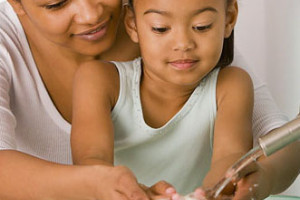Wash your hands!!! We say it to the kids all day long. We see signs for the employees in restaurant bathrooms and then pray that they wash their hands!
However, regardless of our daily washing rituals,we have to wonder if the kind of soap we are all washing our hands with is actually sabotaging our health against the very germs and bugs we are trying to avoid.
I’d like to address some of the serious health and environmental concerns being raised over the insidious and potentially hazardous use of the anti-bacterial chemical triclosan. I’m concerned because this nefarious ingredient is found in three fourths of all household cleansers, including most notably, hand soap.
It’s almost like our collective society has developed OCD regarding our freakiness for cleanliness. I myself confess to having bouts of germaphobia but I still ask, “What are these antibacterial products made with and why such urgency for us to use them?” Do you think it’s really about our wellbeing? Will they really keep us safe from colds and flu’s?
I found there to be more than a few reasons why I want to suggest that we reverse this dangerous trend using triclosan laced antibacterial soaps and products. Here’s the top of the list!
We are born with a multi-faceted and amazing immune system with checks and balances having fantastic capacities to resist, recover from, and build immunity to different diseases. Protective immune boosting qualities like the beneficial bacteria that live on our skin actually defend us from invaders. By introducing the chemical triclosan into our system, body and environment, it causes conditions that negates, damages and kills our very own protective bacteria we depend on to keep us healthy.
Another fundamental reason to avoid using antibacterial soap is to remember that triclosan is an antibiotic. The only difference between washing your hands with anti-bacterial soap containing triclosan and taking an oral course of antibiotics is its application. However, with an oral dose you would take the whole course, but because these soaps only kill 99.99% of all germs the remaining .01% adapt to the chemical and become resistant to it. We are witnessing a global collapse of the effectiveness of our arsenal of antibiotics, such as amoxycilliln, because of drug resistance.
Also of great concern to researchers in the medical community is that triclosan acts as an endocrine disrupter. Exposure to endocrine disruptors can lead to early puberty, serious reproductive issues, and breast cancer. A cosmetic safety database called Skin Deep assigns triclosan a rating of 7 with 10 being the highest rating because of the health risks including cancer, its ability to bio-accumulate (in the body and ecosystem) and irritate organs. Sadly, we are finding this chemical in mothers’ breast milk as well as in our water, as triclosan is notoriously pervasive in the environment.
The most current research has found yet another disturbing consequence of using Triclosan and that is its ability to degrade rapidly into chloroform when exposed to chlorinated water. Most municipal water is treated with chlorine. The most tragic result of this chemical brew is…you got it… cancer.
However, the most basic and rational reason to continue to use regular soap and to ban the anti-bacterial version is that many studies have shown that soaps containing triclosan are no more effective than regular soap. One study, Consumer Antibacterial Soaps: Effective or Just Risky, in Clinical Infectious Diseases reports, “The team looked at 27 studies conducted between 1980 and 2006, and found that soaps containing triclosan within the range of concentrations commonly used in the community setting were no more effective than plain soaps.” Barbara Almanza, an associate professor at Purdue University who teaches safe sanitation practices to workers, recommends that to properly sanitize the hands, soap and water should be used. Sounds like a sound recommendation to me.
So friends, when you’re done playing in the dirt and it’s time to clean up, read your soap labels and keep in mind the perks of the simple, safe and effective use of good’ ol hand soap!

